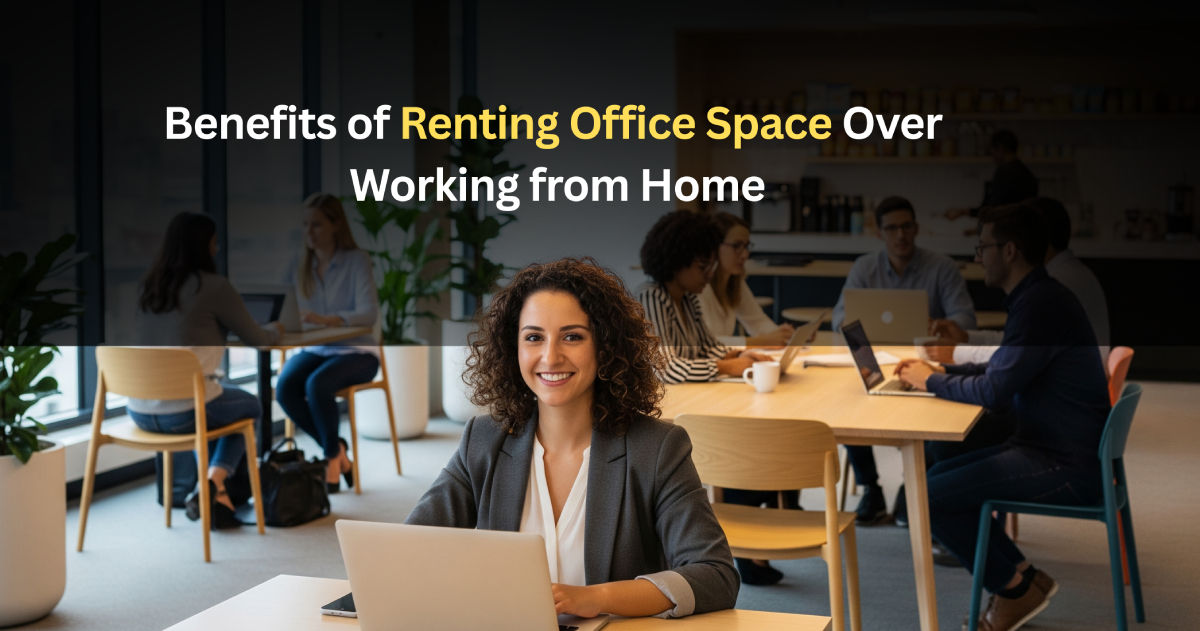In a world where distance dissolves behind high-speed internet, flexible work models and instant global communication, the concept of what it means to have an “office” is undergoing a radical transformation. No longer is an office simply a physical space full of desks, meeting rooms and water coolers; increasingly, it’s a virtual embassy, a symbolic and functional presence brands establish in markets far from their home base. Virtual offices are becoming critical components of global brand strategy. They allow companies to plant flags abroad, test new markets and maintain credibility, all with lower cost, risk and friction than conventional expansion.
This blog explores how virtual offices function as global outposts, why more brands are using them, what advantages and limitations they carry and how to get them right.
What Exactly Is a Virtual Office?
At its core, a virtual office is a suite of services that provides businesses with a professional address (often in a prominent or prestigious location), mail handling, phone reception or call-forwarding and sometimes occasional access to meeting rooms and shared workspace, but without the fixed cost, overheads and commitment of a full physical office.
Some providers also help with legal address registration, local phone numbers, receptionist services and flexible access when one needs to meet clients in that locality.
In many cases, brands use virtual offices not just to save cost but to project presence: local phone number, local address, local legitimacy. Think of them as miniature embassies not of governments, but of brands.
The Rise of the Digital Embassy
Why is this model growing rapidly now? Several trends converge to make this possible:
1. Remote Work & Distributed Teams
COVID-19 accelerated what was already underway: many companies moving to remote or hybrid work. Physical presence became less essential. Where you are matters less; what you produce and how you communicate matter more. Virtual offices enable global operations without physically deploying large teams everywhere.
2. Globalization, But with Local Sensitivity
To win in foreign markets, brands often need something that feels local. A local address, a local phone line and compliance with local rules. Consumers tend to trust businesses that seem “in their region” more than those that are distant. Virtual offices let brands have a foot in many doors, so to speak.
3. Lower Barriers / Lower Risk
Renting or buying property, hiring staff, negotiating leases in unfamiliar territories, all these come with high costs and risks. Virtual offices enable a “soft launch” in multiple markets, allowing for the testing of demand and determining whether a strategy is effective before making significant investments.
4. Legal and Regulatory Acceptance
More jurisdictions now allow business registration tied to virtual addresses, provided certain criteria are met. Some virtual offices are also compliant with things like tax registration, local licensing and company formation.
5. Advances in Communication Technologies
Video conferencing, VoIP, CRM tools and cloud services make many traditional office functions possible from anywhere. Combined with professional support services (reception, meeting rooms on demand), the physical distance becomes less painful.
What Virtual Offices Allow Brands to Do: The Global Outpost Functions
If a virtual office is a brand’s global outpost, what capabilities does it provide?
1. The Prestigious Address: The Cornerstone of Credibility
The most foundational element is the prestigious business address. In the competitive global landscape, credibility is currency. A business address in a premier commercial district, say, on Wall Street, in the City of London, or Bengaluru’s Electronic City, instantly elevates a brand’s professional stature.
- Global Trust Signal: This address is prominently featured on websites, business cards and official documents, signaling to local clients, partners and financial institutions that the company is a serious, established entity. For a startup or an SME looking to penetrate a new market, this non-physical anchor overcomes the initial skepticism often directed at purely online-only businesses.
- Regulatory Compliance: In many countries, a verified local business address is a non-negotiable requirement for legal registration, tax compliance (like India’s GST registration) and opening local bank accounts. The virtual office is the key to unlocking these legal gateways to a new market.
2. The Local Voice: The Power of Seamless Communication
A brand’s communication must feel local. A dedicated, local phone number with a regional area code handled by a professional, virtual receptionist who answers calls in the company’s name is paramount. This creates a “local voice” that builds trust and fosters stronger customer relationships.
In the Digital Embassy, the receptionist becomes a critical, front-line brand ambassador. They don’t just take messages; they manage an international flow of communication, ensuring seamless customer experiences regardless of time zone differences, a critical element for companies operating a “follow the sun” support model.
3. The Physical Touchpoint: Meeting Space Access
While the core operation is virtual, business still requires a human connection. Modern virtual office solutions include on-demand access to fully equipped, professional conference rooms and day offices in prime locations.
This feature solves the key branding dilemma of remote-first companies: where to host client presentations, sign contracts, or conduct high-stakes interviews. The ability to book a premium meeting space with minimal notice maintains the professional image cultivated by the prestigious address, turning a virtual presence into a tangible, high-impact reality when needed.
4. Simplified Market Entry
Using virtual offices, companies can register or establish a branch or subsidiary in a new market with less capital tied up. They can open a local bank account, register with authorities and avoid over-committing. This is particularly useful when exploring whether customers exist in that market and what the regulatory terrain is.
5. Flexibility & Scalability
If demand grows, one can transition from virtual to part-physical: sublet shared office space, rent meeting rooms, hire remote or hybrid employees. If demand falls, scale back easily. Virtual offices lend agility.
6. Cost Efficiency
Cost savings on rent, utilities, furniture, maintenance and permanent staff are all of that is greatly reduced. This frees up resources for core business functions: marketing, product dev, local research, etc.
Providers
To illustrate how widely adopted virtual office solutions are:
- IWG plc offers virtual offices in hundreds of cities worldwide. They provide a professional business address, mail and parcel handling, business registration services, phone answering, etc.
- Servcorp, an older player, provides virtual office services across many major global cities. Their offerings include prestigious business addresses, receptionist services, meeting rooms, etc.
- The Executive Zone helps entrepreneurs set up virtual offices or registered business addresses, including mail & parcel forwarding, phone answering, etc., often for people wanting to expand globally without physically relocating.
These providers show that virtual offices are not just a niche; they’re baked into the toolkit of global expansion.
Challenges and Limitations
But virtual offices are not a panacea. They come with caveats.
1. Legal and Regulatory Constraints
Some countries require physical premises for certain licenses, or restrict the kinds of business you can register with a virtual address. Sometimes, banks or government agencies are stricter about proof of physical presence. Knowing these local laws is essential.
2. Perception Limitations
For certain types of businesses (e.g., retail, hospitality and manufacturing), customers expect to see a tangible facility. Also, some clients might still distrust a business that exists only on paper or a location address without visible physical operations.
3. Operational Limits
Mail handling might lead to delays. Meeting rooms may not always be available nearby when needed. Cultural or time-zone disconnects still exist. Also, relying heavily on virtual office service providers means depending on third-party quality: receptionist, mail forwarding, etc.
4. Competition & Saturation
As more brands use virtual offices, address prestige alone may lose some of its differentiating power. If “everyone” has a London or Dubai address, then what else helps you stand out?
5. Costs Add Up
While virtual offices are cheaper than full physical offices, they are not zero-cost. Premium addresses, phone service, receptionist, etc., do cost. And if one abuses the model (e.g., expecting frequent in-person operations without planning for it), costs may creep up.
Best Practices: Building a Digital Embassy That Works
To make virtual offices work as real strategic outposts, here are some guidelines:
1. Choose the Right Location
Location matters: prestige, credibility, access to clients and regulatory environment. A virtual address in a financial hub or trade center sends a stronger signal than in an obscure suburb. Also, consider tax, corporate law and whether a virtual address is accepted for registration.
2. Ensure Legitimacy
Make sure all services are compliant with local rules. If you are going to register a company using that address, check with lawyers/regulators. If you’ll be opening bank accounts, ensure that banks accept that address.
3. Brand Consistency & Local Adaptation
Use the address, phone number, local domain, local web presence (website landing pages tailored to the region), local currencies and compliance. But maintain core brand voice and values.
4. Provide Access to Real Spaces When Needed
Even if your presence is mostly virtual, having flexible access to meeting rooms, coworking spaces, or partner spaces in that location enhances relationships and credibility. Sometimes nothing beats a face-to-face meeting.
5. Leverage Technology
Use tools like VoIP, video conferencing, CRM, virtual receptionist and cloud file storage. Tools that let remote teams, partners and clients connect seamlessly.
6. Measure & Iterate
Track metrics: leads from that location, costs of virtual office vs benefit, regulatory or legal hurdles encountered and client satisfaction. Use that data to decide whether to deepen presence (rent real office, hire local staff) or scale back.
What This Means for Brands — Strategies & Use-Cases
Here are some strategic ways brands are using virtual offices to expand or strengthen global reach.
- Soft Launching in New Markets: A startup or e-commerce brand wanting to test demand in Europe or Southeast Asia may establish virtual offices in city addresses, use local phone lines and run digital marketing localized to that region. If results are good, then deeper investment follows.
- Regulatory and Legal Presence: For compliance or tax, or banking, in many countries, having a registered local address is essential. Virtual offices facilitate that without needing large overhead.
- Presence for Investors & Partnerships: When raising funds globally or seeking partners, having a local “face” helps. It increases confidence. It’s easier for foreign investors to relate if they know there’s a local address and contact in their time zone.
- Prestige & Branding: Some companies simply use virtual offices to elevate branding — having a London, New York, or Dubai address signals ambition, trustworthiness. For clients, sometimes that prestige matters.
- Hybrid Models: Many businesses use a mixed model: virtual offices for the majority of operations, but occasional physical presence pop-ups, meetings, satellite team members. This hybrid model gives flexibility.
The Future: What’s Next for the Digital Embassy Model
Looking ahead, we can expect some further developments:
1. More Integrated Services
Virtual offices will continue to improve, adding more value-added options: virtual assistants, compliance support, virtual legal and accounting services, and localized digital marketing.
2. Better Tech for Authentic Presence
More immersive virtual meeting spaces, mixed reality, virtual showrooms and local CRM integrations so that clients truly feel you are there. Reputation platforms or verification services to ensure virtual addresses are credible.
3. Local Regulations Adapting
As more businesses use virtual offices, more countries will codify rules around them: what qualifies, what restrictions, what auditing or validation must be done. This may make virtual offices more viable and less risky in many jurisdictions.
4. Competition & Differentiation
More brands will adopt virtual embassies, so differentiation will shift from merely address location to service quality, local fulfilment, cultural adaptation, speed and trust signals.
5. Environmental & Social Impacts
Virtual offices reduce carbon footprint from commuting, reduce infrastructure waste. They also allow more flexible work and, inclusion of remote workers globally. Socially, they may help spread economic opportunity into more regions without needing concentrated, expensive real estate.
Conclusion
The idea of a global brand outpost no longer necessitates skyscrapers, long-term leases, or armies of local staff. Virtual offices are redefining what it means to be present, giving businesses nimble, cost-effective and credible ways to establish themselves in many places at once.
In the modern economy, your digital embassy may well be your most strategic outpost, especially in early expansion, experimentation, or when resources are constrained. For many brands, mastering virtual presence is no longer optional: it’s essential.
Whether you are a startup eyeing new markets, an established firm seeking prestige, or a company modernizing its global footprint, virtual offices offer a powerful tool. Used strategically, they extend your reach without sacrificing agility.




